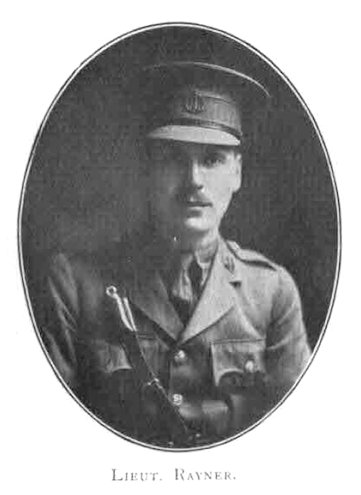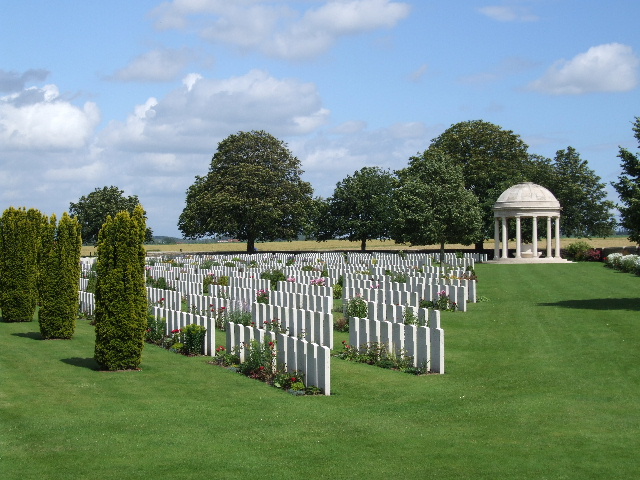Name
George Biddulph Rayner
Conflict
First World War
Date of Death / Age
12/05/1915
31
Rank, Service Number & Service Details
Second Lieutenant
Essex Regiment
3rd Bn.
Awards: Service Medals/Honour Awards
Not Yet Researched
Cemetery/Memorial: Name/Reference/Country
BEDFORD HOUSE CEMETERY
Enclosure No.4 XI. C. 8.
Belgium
Headstone Inscription
Not Researched
UK & Other Memorials
St Edmunds College Memorial, Old Hall Green
Biography
The following text was transcribed from The Edmundian (1914-1919) – The contemporary magazine of St Edmund’s College:
The following letter war written before George's death.
(We regret to add that the writer fell in action on 14th May):
Every moment of my present existence is full of incidents, some, or most, not of a very pleasant nature. I am writing to tell you a. few as I feel it will interest you to know some of the happenings out here. I am not allowed to name places or give an account of the locality. I have had the luck to be attached to the above Brigade which has distinguished itself more than any other in this war. When I first arrived in the firing line from the base I had two days of it, and then after four days in billets I am in the trenches for twelve days. If I give you an account of the Battalion taking up its position in the firing line I shall he recounting my own experiences. All movements are done at night. Late in the evening we "stand to" and then proceed to the trenches to relieve the —. It is a matter of 3 1/2 miles. After we have advanced 2 miles, the fun begins. We are to file and keep close to each other in the dark and led by special guides who know the ground. Shells begin to come unpleasantly near. It takes us nearly two hours to do the last 1 1/2 miles. We pass cautiously through a wood, nearly all the top of the trees have been blown off by shells. In this wood bullets. are flying all over the place. This first experience of being tinder fire (both rifle and shell), gave me quite an attack of cold Feet, but it passed away as soon as I got into the trenches and has never occurred again though I have been under an inferno since. To add to everything, the German flares go up every few minutes and down we all go flat when bullets simply whiz over us from every direction, At last we are in the communication trenches and here we stumble over two dead comrades and 3 wounded.
I am afraid they lay there most of the night. At last we are in the trenches and in one part the Germans are only 15 yards off: by the way I am in command of this particular trench with my platoon.
The most trying part of trench fighting is at night, because all attacks are carried out then; during the day there is quite a lull.
At night one's anxiety is great, firing goes on all along the battle front and never ceases; when the flares go up a perfect hurricane of shot comes from both sides, in make matters worse. An outbreak of rapid fire in volume, as distinct from individual, fairly puts the fear of God into one. This is caused either by excitement on each side or an alarm from a listening post that the Germans are on us, which generally turns out to be false. This. goes on all night, and I have to keep an unceasing look-out. I dare not sit down, but keep on going round to see the men are alert and keeping a careful watch. The strain of this night work is great, and I know many subalterns who go back with shattered nerves.
The reward of day comes, and fire except of shellfire, is reduced to a minimum and gives me time to write letters. It is now two o'clock and shells from the German lines are whizzing over my head in search of our batteries in the rear. The report is deafening also, our aeroplanes are up, evidently searching for the German batteries and are in their turn being shelled, but they hardly ever get touched. It strikes one out here that it will last long. The Germans are exceedingly cock-sure of themselves and it will take a long time to live down this feeling of theirs, In the next trench to mine we have just had a trench mortar fired at us, result, 5 men slightly wounded. My trench is being sapped and we can distinctly hear the Germans working underground; we are counter-mining, but I fear too late.
This morning I collected my expert bomb throwers and threw them where we thought they were working. I am afraid the mortar in our trench is the result.
Please note that the following extract from The Edmundian refers to Lieut. William Henry Rayner, but this man does not appear on the memorial and many of the details seem to agree with those provided for George Biddulph Rayner (this biography) by the Commonwealth War Grave Commission.
Lieut. William Henry Rayner (see above note) was one of two brothers who were at Old Hall from 1895 to 1897. He was the fourth son of Mr. W. Stockham Rayner of Hampstead, and he had quite a number of ecclesiastical relations. Father Gerald Woollett, C.P., was his uncle, and Father Sidney Woollen, C.J. (sometime Vicar Apostolic of Jamaica) his great-uncle; and the Abbess of the well-known community of Poor Clares at Baddesley Clinton is his aunt, On leaving St. Edmund's, he completed his education at. Evreux in Normandy; since when he has been in the stockbroking business in the city. At the outbreak of the war he obtained a commission in the 9th Battalion of the Essex Regiment, afterwards being transported to the Reserve Corps; but on going to France on March 81st. he was transferred to the 2nd Gloucesters.
On May 12th, he was killed by the bursting of a shell in Sanctuary Wood, near Hooge, on the Menin Road in Flanders.
Acknowledgments
Jonty Wild, Di Vanderson, The Edmundian (1814-1819) – The contemporary magazine of St Edmund’s College



